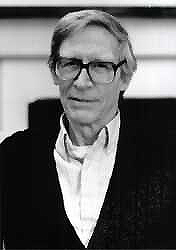 Modern Harvard philosopher.
Modern Harvard philosopher.
In his most famous book, Theory of Justice (1971), John Rawls proposed the idea of ‘original position’, a mental exercise whereby a group of rational people must establish a principle of fairness (such as distribution of income) without knowing beforehand where on the resulting pecking order they will end up themselves.
John Rawls used this device to argue that the optimal arrangement will be to ‘maximize the welfare of society’s worse-off member’, which effectively justifies an egalitarian “no-substitution” social welfare function.
John Rawls died of heart failure on November 24, 2002.
Major works of John Rawls
– Outline of a Decision Procedure for Ethics, 1951, Philosophical Review
– Two Concepts of Rules, 1955, Philosophical Review
– Justice as Fairness, 1957, J of Philosophy
– The Sense of Justice, 1963, Philosophical Review
– Constitutional Liberty and the Concept of Justice, 1963, Friedrich and Chapman, eds., Nomos, VI: Justice
– Legal Obligation and the Duty of Fair Play, 1964, in S. Hook, ed., Law and Philosophy
– Distributive Justice, 1967, in Laslett and Runciman, eds., Philosophy, Politics, and Society
– The Justification of Civil Disobedience, 1969, in Bedau, ed., Civil Disobedience
– Theory of Justice, 1971
– Justice as Reciprocity, 1971, in Gorovitz, ed., Utilitarianism
– Legal Obligation and the Duty of Fair Play, 1971, in Murphy, ed., Civil Disobedience and Violence
– Some Reasons for the Maximin Criterion, 1974, AER
– Fairness to Goodness, 1975, Philosophical Review
– A Kantian Conception of Equality, 1975, Cambridge Review
– The Basic Structure as Subject, 1977, American Philosophical Quarterly
– Kantian Constructivism in Moral Theory, 1980, Journal of Philosophy
– The Basic Liberties and Their Priority, 1982, in McMurrin, ed., Tanner Lectures on Human Values
– Social Unity and Primary Goods, 1982, in A. Sen and B. Wiliams, eds., Utilitarianism and Beyond
– The Idea of an Overlapping Consensus, 1987, Oxford Journal for Legal Studies
– The Priority of Right and Ideas of the Good, 1988, Philosophy & Public Affairs
– The Domain of the Political and Overlapping Consensus, 1989, NYU Law Review
– Themes in Kant’s Moral Philosophy, 1989, in Forster, ed., Kant’s Transcendental Deductions
– The Law of Peoples, 1993, Critical Inquiry
– Political Liberalism, 1993
– The Law of the Peoples, 1999
– Collected Papers, 1999
– Lecture on the History of Moral Philosophy, with Barbara Hermann, 2000

Would love to always get updated outstanding site! .
Appreciate this post. Let me try it out.
Pretty! This has been an extremely wonderful post.
Many thanks for providing this info.
WOW just what I was searching for. Came here by searching for website
magnificent publish, very informative. I wonder why the other
specialists of this sector don’t notice this. You must continue your writing.
I am confident, you have a great readers’ base already!
It’s really a nice and useful piece of information. I am happy that you shared this
helpful info with us. Please stay us up to date like this.
Thank you for sharing.